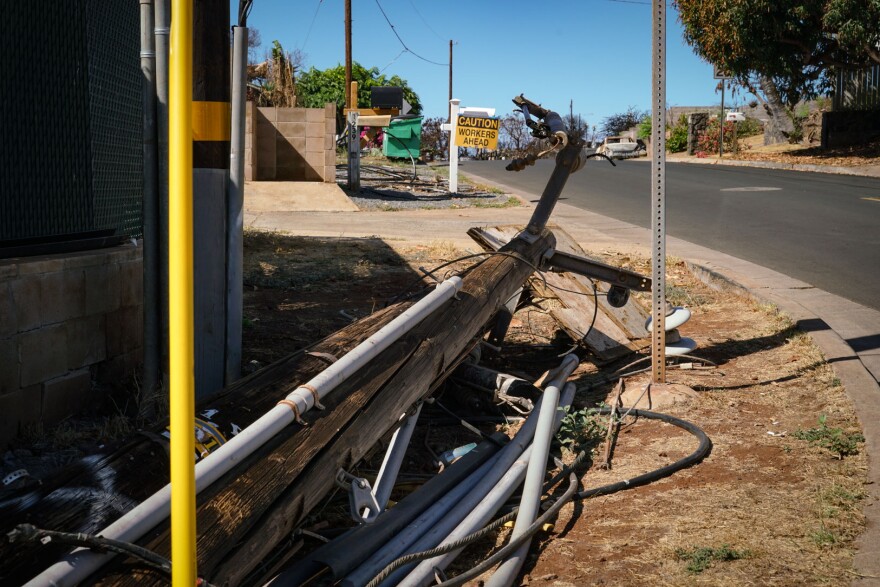Despite sizable public opposition, lawmakers are racing to finalize a bill that could pass the costs of the Maui wildfires onto ratepayers.
Senate Bill 2922 would authorize Hawaiian Electric to raise money by issuing bonds backed by its own customers, also known as a financial maneuver called securitization.
The measure has changed significantly over the course of its journey through the House and Senate. Lawmakers have until the end of the week to reach an agreement on the bill’s final form — if they can agree on it at all.
Proponents say the measure is necessary to keep HECO from declaring bankruptcy and to fund critical wildfire mitigation efforts. But critics claim the bill, introduced on behalf of HECO, offers little more than a bailout of the imperiled electric utility.
Then, there's the matter of the bill's contents. Versions that passed in the House and Senate contain markedly different language about the purpose of the measure and, crucially, restrictions on how a public utility can fundraise from its customer base.
Hawaiian Electric has maintained a precarious financial position since the Maui wildfires. In the days following Aug. 8, HECO saw its stock price fall nearly 75% as it became clear that the company may be held liable for up to billions of dollars in damages. Multiple rating agencies downgraded HECO's credit rating to junk status, limiting the company’s ability to borrow money without taking out high-interest loans.
Securitization offers HECO a way to get back on track through low-interest, long-term bonds with a guaranteed repayment plan: customer money. The cost of these bonds would appear on ratepayers’ bills as monthly charges that may continue for years.
Securitization is necessary to “leapfrog” turmoil, HECO CEO says
If SB2922 passes, Hawai‘i would join more than half of U.S. states in permitting utilities to pay off one-time expenses with securitized bonds.
As man-made climate change increases the frequency and severity of natural disasters, public utilities around the country are turning to securitization to stave off insolvency, recover from crises and prepare for future disasters.
California has been home to some of the earliest and largest securitization cases, many of which involved the state’s largest utility company, Pacific Gas and Electric.
PG&E declared bankruptcy in 2019 while facing massive liability for the role its equipment played in causing multiple wildfires in the state. In 2021, regulators authorized the Northern California utility to take out $7.5 billion in ratepayer-backed bonds in order to refinance some of its resulting debt.

In the case of Hawaiian Electric, CEO Shelee Kimura hopes securitization will help the company avoid bankruptcy entirely.
“What we're trying to do is create the package that will allow us to leapfrog all the turmoil that PG&E had to go through to get to the point they're at today,” Kimura said to Hawaiʻi state senators in a hearing last Thursday on the utility’s wildfire mitigation efforts.
At the hearing, top HECO executives said they were sensitive to Hawaiʻi residents’ outsized energy burden. HECO Chief Information Officer Jason Benn stated that securitization is “literally the cheapest way” for the utility to finance wildfire recovery efforts and future mitigation.
He added that a 2.1% rate increase would add $4 on average to each customer’s bill. Cumulatively, that securitization fee would raise $1 billion for the utility.
Securitization isn’t the only step that the utility is taking. Kimura said that the company has suspended dividends for shareholders and is looking to possibly liquidate some of its real estate holdings. But she emphasized that access to ratepayer-backed bonds would be critical to the utility’s way forward.
“This is an important legislative session for us,” Kimura said. “From our perspective, we believe that this is the best path for Hawaiʻi.”
The clock is ticking on a contentious measure
SB2922, the securitization bill in Hawaiʻi, is currently being heard in conference committee — a process used when two different versions of a measure have been passed in the House and Senate.
For the measure to pass, lawmakers must come up with one bill by Friday evening.
Not all lawmakers are on board with a securitization bill. Speaking before the House earlier this month, Rep. Elle Cochran of West Maui, including Lahaina, argued that the measure would fine her struggling constituents for HECO’s alleged negligence and mismanagement.
“It gives an open line of credit to HECO,” she said. “And at this time, as you can imagine, the town of Lahaina really has no trust.”
Ten lawmakers including Cochran voted against the bill in the House; five more voted yes with reservations. Some lawmakers’ opposition echoes the sentiment of more than a thousand people who submitted testimony against the bill.
“I really feel that until the totality of their liability is determined and accountability is taken by HECO, that it’s really premature to allow legislation to come forth with this kind of bailout,” said Katie Martin, an organizer with Lahaina Strong. The organization put out a request to its followers to testify against the measure before it passed in the House.
But others say that securitization is necessary — not only for HECO to remain solvent, but also to prevent more drastic rate hikes to customers. The Senate’s version of the bill passed unanimously, and Gov. Josh Green said that he thinks it’s essential for lawmakers to reach a consensus on the final bill to keep the utility in “local control.”
“If we allowed HECO to die, or another partner to swoop in and take them over aggressively, we could see much higher costs,” Green said.
He added that Hawaiian Electric's financial health was directly tied to both wildfire recovery and the state’s ongoing transition to clean energy.
“That bill should allow for a very small commitment from all of us across the state to keep our energy futures alive,” Green said.
Green anticipates that lawmakers will pass “smart” legislation that can be refined in future sessions.
What's next?
The political will for a securitization measure extends to the majority of lawmakers who voted in favor of SB2922 in both chambers despite negative public perception. Rep. Nicole Lowen, a co-chair on the conference committee to rewrite SB2922, thinks the measure has been overly politicized and poorly understood.
“Calling it a ‘HECO bailout bill’ doesn't really accurately reflect what it's doing,” she said.
To Lowen, economics are at the heart of the issue. Compared to simply raising utility customers’ rates, securitization can insulate ratepayers by spreading out the cost over a longer period of time.
Securitization is also a way that utilities can pay off debt at a lower interest rate than if they borrowed money without it, said Mark Toney, executive director of the California-based consumer advocacy group The Utility Reform Network.
“Ratepayers end up spending a lot less money over time,” Toney said.

To be sure, the measure would first and foremost benefit the utility company. And Toney, who has been involved in PG&E’s latest securitization case, raised concerns over the idea that ratepayers would be on the hook for costs resulting from a utility’s negligence.
“If the utility is found negligent, and if they want to go through securitization to pay off their debt and use ratepayers, then there has to be a guarantee that shareholders reimburse the ratepayers in real time,” Toney said.
While California has some of the highest utility rates in the country, the $7.5 billion securitization measure has not resulted in an increased cost to consumers. That's because of a California state provision that says if a utility is responsible for a wildfire, it can’t transfer its costs onto ratepayers.
PG&E customers see a charge for the securitization bonds on their bills, but they also receive a bill credit for the exact same amount, which comes out of shareholders' pockets, Toney said.
No comparable provision exists in any version of SB2922, and it’s too late for lawmakers to introduce new language into the measure this legislative session. Still, there's a lot on the table for the conference committee to debate.
The Senate's version of the bill did not cap the cost of securitization to ratepayers. In the House, however, lawmakers amended the measure to limit an increase to 5% of the average residential customer bill. The House and Senate bills also differed on the requirements that utilities have to meet in order to issue ratepayer-backed bonds. Both versions mandate that the utilities receive approval from Hawaiʻi's Public Utilities Commission.
Securitization represents an opportunity to resolve uncertainty over HECO's future and nudge outcomes in a direction that ultimately benefits ratepayers, Lowen said.
“If we do nothing, we're going to lose this narrow window of opportunity we have to actually try to shape the future,” she said.








